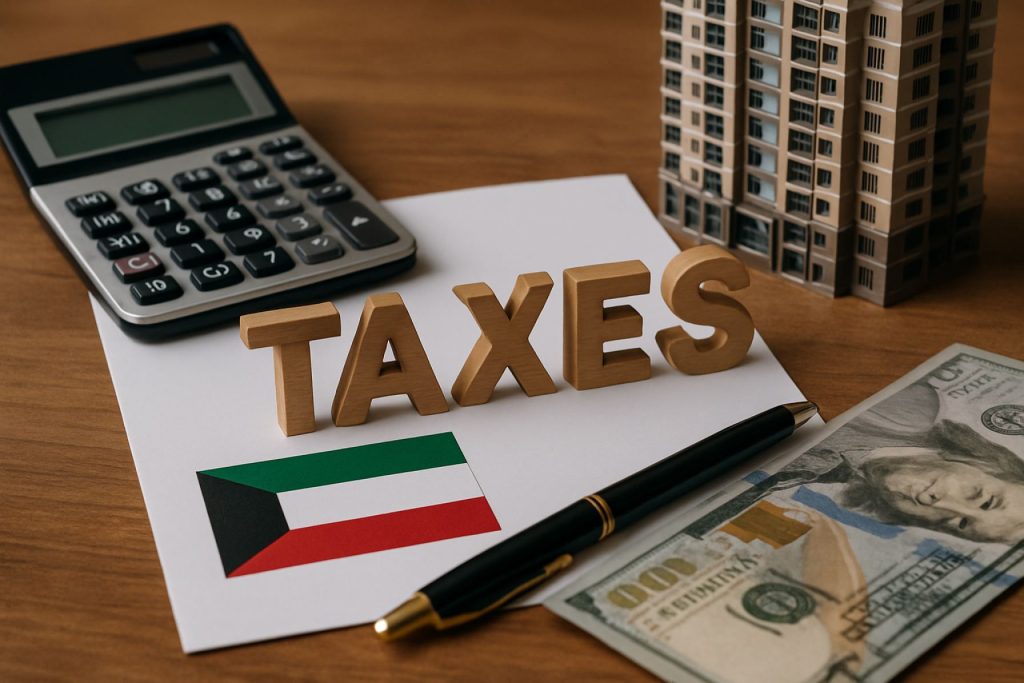
Table of Contents
- Introduction: The Current Real Estate Tax Landscape in Kuwait
- Key Tax Laws and Regulations for Property Owners (2025 Update)
- Recent Legislative Changes: What’s New This Year?
- Compliance Requirements: How to Stay on the Right Side of the Law
- Critical Tax Rates, Deductions, and Exemptions Explained
- The Role of the Kuwait Ministry of Finance and Official Guidelines
- Common Tax Pitfalls and How to Avoid Them
- Statistical Overview: Current and Historical Tax Data
- Future Outlook: Predicted Trends in Real Estate Taxation (2025–2030)
- Official Resources and Where to Get More Information (e.g., mof.gov.kw)
- Sources & References
Introduction: The Current Real Estate Tax Landscape in Kuwait
Kuwait’s real estate sector is a cornerstone of its non-oil economy, accounting for a significant portion of domestic investment and government revenue. As of 2025, the country’s approach to real estate taxation remains distinctive in the region: there is no general property tax, and real estate transactions are primarily regulated through transfer fees and specific levies. The absence of a broad-based property tax is rooted in Kuwait’s historical reliance on oil revenues and its commitment to maintaining a business-friendly environment to encourage investment and homeownership.
Currently, the principal tax-related obligations in the real estate sector involve registration and transfer fees imposed during the sale or acquisition of property. These are administered by the Ministry of Justice and the Ministry of Finance, with the fees typically calculated as a percentage of the property’s registered value. For most transactions, the transfer fee is set at 1% of the asset’s declared value, payable by the buyer at the time of registration. There are also stamp duties and administrative charges, but these are comparatively modest. Notably, there is no annual tax on ownership or capital gains tax for individuals, further differentiating Kuwait from many global jurisdictions.
Despite the lack of an annual property tax, compliance remains critical, particularly regarding the accuracy of declared property values during registration. The authorities have implemented measures to mitigate under-valuation and ensure that transaction reports reflect market realities. Additionally, foreign ownership is tightly regulated: only GCC nationals and Kuwaiti citizens may own real estate, except in rare cases approved by the Kuwait Municipality or in designated development zones.
Key statistics highlight the sector’s prominence: in 2023, real estate transactions exceeded KD 4.2 billion, with residential sales dominating. While there has been ongoing discussion about introducing new forms of real estate taxation—particularly as part of broader fiscal diversification strategies—no formal legislation has been enacted as of early 2025. The National Assembly continues to review potential reforms, including the possibility of a limited property tax or value-added tax (VAT) affecting real estate services, but these remain at the proposal stage.
Looking ahead, the outlook for real estate taxation in Kuwait is one of cautious evolution. While the current regime favors investors and homeowners through minimal direct taxation, fiscal pressures and regional trends toward tax reform are likely to prompt further debate. Stakeholders should monitor legislative developments closely, as changes could impact both compliance requirements and the overall investment climate.
Key Tax Laws and Regulations for Property Owners (2025 Update)
Kuwait’s real estate sector operates within a unique tax environment, shaped by the absence of personal income tax and minimal direct taxes on property ownership for individuals. As of 2025, Kuwaiti nationals and GCC citizens remain exempt from property taxes on residential real estate. However, evolving economic strategies and fiscal reforms are prompting closer scrutiny of real estate transactions and ownership, especially for non-Kuwaiti entities and investors.
The principal legislative framework governing real estate taxation includes the Income Tax Decree No. 3 of 1955 (as amended), which applies primarily to foreign companies operating in Kuwait. Under this law, foreign corporate entities owning or trading in real estate are subject to a flat 15% income tax on profits derived from such activities. Kuwaiti and GCC nationals, by contrast, are exempt from these taxes for personal holdings, reflecting the government’s policy to encourage local property ownership.
Kuwait does not impose a property tax or annual real estate tax on individuals. However, other charges such as registration fees, transfer fees, and potential capital gains tax for certain transactions involving foreign entities apply. The Ministry of Justice’s Real Estate Registration Department oversees property registration and ensures compliance with applicable fees, which are typically one percent of the property’s value at the time of transfer (Ministry of Justice).
Recent years have seen increasing discussion regarding the introduction of a value-added tax (VAT) regime and possible new forms of real estate taxation as part of broader fiscal diversification plans. While no VAT or general property tax has been implemented as of 2025, regulatory authorities continue to study such measures in line with regional trends and commitments to the Gulf Cooperation Council. The Ministry of Finance has signaled ongoing assessment of potential tax reforms, although no official draft law has been submitted to the National Assembly as of early 2025.
Compliance for corporate and foreign property owners is enforced through rigorous reporting and documentation requirements. Non-compliance can result in penalties, fines, or restrictions on property transactions. It is mandatory for all property sales, transfers, and leases to be registered with the Real Estate Registration Department, which coordinates with the Ministry of Justice and the Ministry of Finance to verify tax and fee payments.
Looking ahead, while the tax landscape for individual owners remains favorable, the government’s focus on fiscal sustainability suggests that property tax reforms may yet be introduced within the next few years. Property investors—especially foreign and corporate entities—should monitor legislative developments and maintain strict compliance with all registration and reporting obligations.
Recent Legislative Changes: What’s New This Year?
Kuwait’s real estate tax framework has historically been limited, with no direct annual property taxes imposed on property owners. Instead, the focus has been on transaction-related fees and select sector-specific levies. However, in 2025, several noteworthy legislative developments and regulatory initiatives are shaping the compliance environment for real estate stakeholders.
The most significant recent development is the ongoing legislative process surrounding the proposed real estate tax law, which is under discussion by the Kuwaiti National Assembly. The draft law aims to introduce a property tax on residential and commercial real estate holdings, targeting both citizens and expatriates. The objectives are to curb speculative investments, address housing shortages, and increase government revenue diversification. As of early 2025, the law has passed several readings, but full ratification and implementation timelines remain under deliberation. Key elements under consideration include tax rates, exemptions for primary residences, and phased implementation to minimize market disruption (National Assembly of Kuwait).
In parallel, the Ministry of Finance has issued updated guidance on the collection of real estate transfer fees, which are currently set at 0.5% of the transaction value. Enhanced compliance requirements now mandate the electronic submission of transaction documentation and proof of payment through the government’s unified portal. This digitization initiative is intended to increase transparency, reduce evasion, and streamline the registration process (Ministry of Finance).
For non-Kuwaiti investors, the 2025 amendments to the Foreign Ownership Law maintain existing restrictions on direct property ownership, but introduce clearer procedures for leasehold arrangements and joint-venture structures. These changes are designed to attract foreign capital while safeguarding national interests (Ministry of Justice).
Key statistics released by the Public Authority for Civil Information indicate that real estate transaction volumes increased by 8% in the past year, while the value of collected transfer fees rose by 12%, reflecting both market growth and improved compliance.
Looking ahead, the outlook for real estate taxation in Kuwait involves a gradual shift toward more structured and transparent tax mechanisms. Stakeholders should closely monitor legislative proceedings and prepare for potential compliance requirements, including digital reporting and possible annual tax declarations, expected to be phased in over the next few years.
Compliance Requirements: How to Stay on the Right Side of the Law
Staying compliant with real estate tax regulations in Kuwait requires a clear understanding of the country’s legal framework, ongoing legislative developments, and the practical obligations expected from property owners, investors, and developers. As of 2025, Kuwait does not impose a direct real estate or property tax on individuals or companies owning real estate. However, several indirect taxes, fees, and compliance requirements are pertinent, particularly for non-Kuwaiti investors and corporate entities.
- Corporate Income Tax and Withholding: While Kuwaiti nationals and GCC companies are generally exempt from corporate income tax, foreign entities and their branches operating in Kuwait are subject to a flat corporate income tax rate of 15% on taxable profits, which may include income derived from real estate transactions, rentals, or development projects (Ministry of Finance – Kuwait).
- Registration and Transfer Fees: All real estate transactions must be registered with the Ministry of Justice’s Real Estate Registration Department. Transaction fees, including transfer and registration charges, are typically calculated as a percentage of the transaction value and must be paid to ensure the validity and enforceability of property ownership (Ministry of Justice – Kuwait).
- Municipality Charges: Owners of commercial and investment properties are also subject to annual municipality service charges, which fund local infrastructure and sanitation services. These are assessed and collected by the Kuwait Municipality and vary by property type and location.
- Reporting and Documentation: Proper documentation—including sales contracts, title deeds, and proof of fee payment—is essential for legal compliance. All documents must be in Arabic or officially translated, and timely submission to relevant authorities is mandatory to avoid penalties or disputes.
- Anti-Money Laundering (AML) Compliance: Real estate professionals and financial institutions must adhere to the country’s AML laws, which include client due diligence and reporting of suspicious transactions, as outlined by the Central Bank of Kuwait and Ministry of Finance – Kuwait.
Looking ahead, compliance requirements in Kuwait’s real estate sector are expected to tighten as authorities work to align with international tax transparency and anti-financial crime standards. Stakeholders should monitor official channels for legislative updates, and engage licensed legal or tax advisors to ensure ongoing adherence to evolving regulations.
Critical Tax Rates, Deductions, and Exemptions Explained
Kuwait’s real estate tax framework remains markedly distinct from many global systems, owing to the absence of a direct property tax regime. As of 2025, there is no annual property tax levied on real estate ownership for either residents or non-residents in Kuwait. The main fiscal obligations relating to real estate arise during the transaction phase, with several indirect taxes and fees applicable at the point of sale or transfer.
The critical tax component for real estate transactions is the registration fee, which is typically set at 0.5% of the property’s value, payable to the Ministry of Justice. This fee is assessed based on the declared sale value or the estimated market value determined by the ministry, whichever is higher. There are no official deductions or exemptions prescribed for this registration fee. Additionally, a nominal stamp duty may apply to certain documentation, but this remains minimal and is not considered a significant tax burden.
Kuwait does not impose capital gains tax on individuals selling real estate, regardless of the gain realized. However, corporate entities engaged in real estate transactions may be subject to income tax if they are foreign companies, as per the Ministry of Finance. The standard corporate income tax rate for foreign entities stands at 15%, and taxable income includes any profits derived from the sale or rental of real estate. Kuwaiti-owned companies and Gulf Cooperation Council (GCC) entities remain exempt from this income tax obligation.
One notable restriction in Kuwait’s real estate market is that foreign individuals are generally prohibited from owning property, with exceptions granted only under specific conditions and subject to ministerial approval (Ministry of Justice). This largely confines real estate tax compliance and liability to Kuwaiti nationals and qualifying GCC citizens.
Looking ahead to the next few years, the outlook for real estate taxation in Kuwait is characterized by stability. There are currently no announced plans by the government to introduce property tax, increase transfer fees, or implement capital gains tax on real estate. However, ongoing fiscal reforms and regional economic diversification initiatives may prompt future consideration of broader tax reforms, especially if public revenue needs change (Ministry of Finance). For 2025, the real estate tax landscape in Kuwait remains highly favorable compared to most international markets, with low transaction costs being a continued incentive for property investment by eligible parties.
The Role of the Kuwait Ministry of Finance and Official Guidelines
The Kuwait Ministry of Finance plays a central role in the formulation, administration, and enforcement of all taxation policies, including those pertaining to real estate. As of 2025, Kuwait does not levy a direct real estate tax on the ownership or transfer of residential or commercial properties. Instead, related fiscal obligations are primarily managed through stamp duties, registration fees, and indirect taxes that impact property transactions and land use.
The Ministry’s official guidelines are set forth in various resolutions and circulars, outlining the obligations for property owners, developers, and investors. For instance, property registration fees—typically a percentage of the property value—are mandated at municipal offices under supervision by the Ministry. These fees are enforced at the point of sale or transfer, ensuring compliance through the property registration process. Additionally, non-Kuwaiti individuals and companies face restrictions on ownership and may be subject to different fee structures or approval processes, as regulated by the Ministry of Finance and periodically updated through ministerial decrees.
Corporate entities, especially foreign-owned companies, are subject to the Kuwait income tax law, which includes provisions for the taxation of income derived from real estate. The current corporate income tax rate stands at 15% for foreign entities on income sourced within Kuwait, which can include gains from the sale or rental of property. The Ministry of Finance issues clarifications regarding taxable events, deductibility of expenses, and reporting requirements for such entities.
Compliance with these regulations is monitored by the Ministry’s Tax Administration sector, which regularly updates procedural guidelines and provides digital services for tax declarations and payments. Non-compliance can lead to penalties, delayed property transactions, or legal disputes. In 2023, the Ministry rolled out an online portal to streamline the submission of tax-related documents, facilitating better oversight and transparency.
Statistically, the Ministry’s annual reports indicate that property transaction fees and related indirect taxes contribute a modest but stable portion of state revenues, with incremental year-on-year growth. Despite calls for the introduction of a comprehensive real estate tax—especially to curb speculation and stabilize housing markets—no new direct taxes are scheduled for implementation as of 2025. However, the Ministry continues to study international models and monitor domestic market trends, suggesting that policy adjustments may be considered if fiscal or economic conditions necessitate. Official guidance and updates can be tracked via the Ministry’s website and annual financial statements (Ministry of Finance).
Common Tax Pitfalls and How to Avoid Them
Real estate taxation in Kuwait is unique compared to other jurisdictions in the Gulf region, primarily due to the absence of a comprehensive personal income tax system and the specific application of taxes on real estate transactions and corporate holdings. As the government has increased scrutiny on compliance and sought to diversify non-oil revenues, investors—both local and foreign—face a range of potential tax pitfalls. Understanding these challenges is critical for tax efficiency and legal compliance in 2025 and the years ahead.
- Registration and Transfer Fees: While Kuwait does not levy a capital gains tax on real estate sales, it imposes a registration fee of 1% of the property’s value for every transfer. Investors sometimes underestimate the documentation required for accurate property valuation, leading to disputes or delays in title transfer. Ensuring timely and complete submission of documentation to the Ministry of Justice is essential to avoid penalties or protracted transactions.
- Corporate Tax on Foreign Entities: Foreign companies operating or investing in Kuwaiti real estate are subject to a 15% corporate income tax on income derived from sources within Kuwait. Misclassifying income or failing to properly declare rental or capital gains can trigger audits and back taxes, particularly as the Ministry of Finance has enhanced its tax review mechanisms since 2023. Accurate record-keeping and consultation with qualified tax professionals are vital to avoid costly errors.
- Municipality Tax: A 2.5% annual municipality tax applies to rental income from properties, payable by landlords. Pitfalls include underreporting rents, especially in mixed-use or multi-tenant properties, and missing payment deadlines, which can lead to fines. Automated reporting through the Kuwait Municipality portal should be diligently used to ensure compliance.
- Value Added Tax (VAT) Prospects: While VAT has not been implemented as of 2025, the ongoing regional discussions and Kuwait’s commitment to fiscal reform under the Ministry of Finance’s plans mean that property investors should monitor legislative developments closely. Preparing for future VAT on commercial properties can help avoid sudden compliance burdens.
- Ownership Restrictions: Foreign ownership of real estate is heavily restricted, and attempts to circumvent these laws—such as using proxy ownership structures—can result in forfeiture of property and criminal penalties under the Ministry of Justice’s enforcement of Law No. 74/1979. Due diligence on ownership rights and structuring is critical.
In summary, the main pitfalls center on incomplete documentation, misclassification of taxable income, late tax payments, and non-compliance with ownership laws. Proactive engagement with official platforms and professional advisors is the best strategy to avoid these risks as regulatory oversight tightens through 2025 and beyond.
Statistical Overview: Current and Historical Tax Data
Kuwait’s real estate sector remains a significant pillar of its non-oil economy, with property transactions and land holdings subject to a range of fiscal measures. Unlike many countries, Kuwait does not levy a direct real estate tax or annual property tax on individuals or companies. However, there are other forms of taxation and fees associated with real estate transactions, most notably the stamp duty and registration fees imposed during property transfers.
As of 2025, the principal charge related to real estate is a stamp duty of 0.5% applied to the value of the property upon registration of transfer. This rate has remained consistent over the past decade, with minor adjustments periodically discussed but not implemented as of the most recent legislative updates. In addition, registration fees for property transactions are collected by the Ministry of Justice, which oversees the Real Estate Registration Department. These fees are calculated based on the property’s value and type, with residential and commercial properties subject to different bands.
Statistical data from the Central Statistical Bureau shows that the total value of real estate transactions in Kuwait reached approximately KD 4.5 billion in 2023, marking a slight increase from KD 4.3 billion in 2022. The number of annual property transfers has also shown steady growth, with 17,500 transactions recorded in 2023 compared to 16,900 in the prior year. These figures reflect a resilient real estate market, driven by both domestic demand and limited foreign participation, given current regulatory restrictions on non-Kuwaiti ownership.
Compliance with real estate transaction tax obligations is monitored by the Ministry of Finance, in coordination with the Ministry of Justice. Registration and payment of associated fees are mandatory for legal transfer of property title, and non-compliance can result in delays or invalidation of transactions.
Looking forward, there have been ongoing discussions within the National Assembly regarding the introduction of broader real estate taxation, such as annual property taxes or vacant land taxes to curb speculation and promote housing supply. However, as of early 2025, no such measures have been enacted. The outlook suggests that while incremental changes in transaction fees may occur, sweeping tax reforms in the real estate sector are unlikely in the immediate future barring major legislative shifts.
Future Outlook: Predicted Trends in Real Estate Taxation (2025–2030)
The landscape of real estate taxation in Kuwait is poised for incremental changes between 2025 and 2030 as the government continues to respond to fiscal pressures and the need for diversified revenue streams. Historically, Kuwait has not imposed a comprehensive real estate tax on property ownership; instead, related taxes and fees are limited to transaction fees, registration fees, and municipal charges. However, recent legislative discussions and regional trends suggest a potential shift toward more structured real estate taxation in the near future.
In 2024 and 2025, parliamentary committees and the Ministry of Finance have actively reviewed proposals aimed at addressing real estate market imbalances and curbing speculative activities. Notably, draft legislation has been introduced to impose taxes on vacant residential land, aiming to increase supply for local buyers and discourage land hoarding. If enacted, such laws would introduce a new tax regime, requiring property owners to comply with annual filings and payments for undeveloped or unutilized plots. This aligns with similar measures already implemented in neighboring Gulf states and reflects a broader regional movement toward fiscal reform and revenue diversification.
Compliance requirements are expected to tighten as new tax mechanisms are introduced. Property owners will likely need to register assets, maintain accurate records, and submit regular disclosures to the Public Authority for Civil Information and the Ministry of Justice, which oversees property registration and transfers. Real estate investors and developers should anticipate increased scrutiny and potential penalties for non-compliance as the government seeks to ensure transparency and effective enforcement.
Statistically, the real estate sector constitutes a significant portion of Kuwait’s GDP, with estimates from the Central Statistical Bureau showing steady growth in transaction volumes and values since 2022. However, a concentration of ownership and underutilization of urban plots has prompted calls for reform. The introduction of targeted real estate taxes is expected to encourage more efficient land use and support broader housing availability, particularly for Kuwaiti nationals.
Looking ahead to 2030, it is likely that Kuwait will gradually adopt more systematic real estate taxation, especially on non-primary residences and undeveloped land. While implementation timelines depend on parliamentary approval and administrative readiness, stakeholders should prepare for new compliance obligations, evolving tax rates, and digitalization of property-related filings. Overall, these changes aim to bolster fiscal sustainability, address housing challenges, and align Kuwait with international best practices in real estate governance.
Official Resources and Where to Get More Information (e.g., mof.gov.kw)
Kuwait’s real estate tax landscape is shaped by a framework of laws, regulations, and administrative procedures managed by several official bodies. For individuals and businesses seeking authoritative information or needing to ensure compliance, direct engagement with government sources is essential. The following are core official resources for up-to-date guidance on real estate taxation in Kuwait as of 2025:
-
Ministry of Finance (MOF): The Ministry of Finance is the primary authority administering tax policy and fiscal regulations, including those that pertain to real estate. The MOF’s official website provides access to legislative texts, public circulars, and contact details for tax queries. Relevant sections offer information on property-related fees, stamp duties, and any updates to tax structures.
Ministry of Finance -
Kuwait Municipality: Responsible for issuing building permits, property registration, and zoning compliance, the Municipality’s portal is useful for understanding fees imposed on real estate transactions and municipal obligations for owners and developers.
Kuwait Municipality -
Ministry of Justice: Through its Real Estate Registration Department, the Ministry of Justice handles property transfers, deeds, and registration—processes that may involve stamp duty or administrative charges. The Ministry’s website enables individuals to access forms, regulations, and procedural guides.
Ministry of Justice -
Public Authority for Civil Information (PACI): PACI maintains authoritative records on property locations and ownership status, which are crucial for compliance and due diligence in real estate transactions.
Public Authority for Civil Information -
Kuwait Chamber of Commerce and Industry (KCCI): For investors and enterprises, the KCCI’s website offers bulletins and advisories concerning commercial property regulations, applicable fees, and legal developments that may impact real estate holdings.
Kuwait Chamber of Commerce and Industry
For the most current and reliable information on real estate taxes, regulatory changes, or compliance requirements in Kuwait, these official platforms should be consulted directly. They regularly update procedures, publish new legislation, and provide channels for inquiries, ensuring stakeholders remain compliant in 2025 and beyond.



